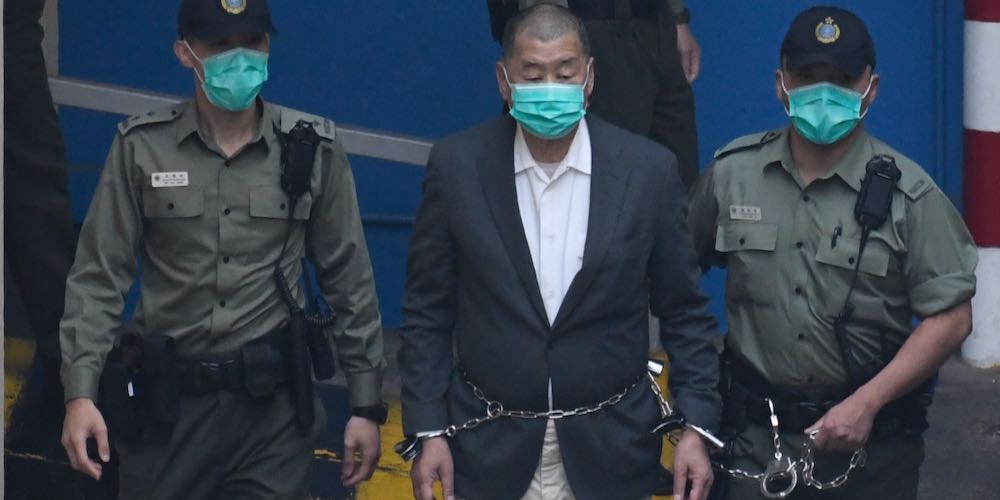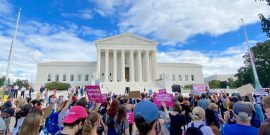The Heroic Jimmy Lai
I have not yet had the pleasure of meeting Jimmy Lai, the jailed Hong Kong freedom activist and entrepreneur. But I have heard of him for most of my adult life. In 2000, when I was an intellectual refugee from the US Foreign Service, cutting my teeth as a young classical liberal pup at the Atlas Economic Research Foundation, Lai was already a household name.
The Acton Institute has produced a hard-hitting, poignant, clean, informative, and infuriating documentary on Jimmy Lai: The Hong Konger: Jimmy Lai’s Extraordinary Struggle for Freedom. It features interviews with friends of Jimmy Lai, including former colleagues, fellow journalists, American diplomats, and Hong Kong freedom activists. The movie deftly weaves a succinct but comprehensive history of Hong Kong with interviews.
This past May 18, Jimmy Lai was awarded the Cato Institute’s top recognition, the Milton Friedman Prize for Advancing Liberty. Unfortunately, he was unable to travel to Washington, DC, because he is moldering in a Chinese jail for a combination of trumped-up charges and participation in unauthorized peaceful marches for freedom. The 75-year-old Lai, who has already been sentenced to six years, faces the prospect of life in prison when he is tried in September 2023 under Hong Kong’s broad National Security Law.
I first traveled to Hong Kong in the summer of 2014, to teach for the Fund for American Studies at the University of Hong Kong. Lai was such an Olympian figure that I dared not approach him. I was also, admittedly, enthralled and distracted by the vibrancy and grit of the Fragrant Harbor. I fell in love with Hong Kong and had the pleasure of visiting the territory six times for summer courses, and once on a winter vacation. Although I am not highly visible, I cannot return until things change dramatically. Indeed, under the 2020 National Security Law, I run the risk of arrest if I ever set foot again in Hong Kong or China. Though the odds are low, I am not willing to run the risk of arrest, detention without counsel, and three years to life in a Hong Kong prison—or extradition to the mainland—for some of my “seditious” writings on China. I have justified my prudence by calculating that there is a very high expected marginal cost to my return to Hong Kong, but the marginal benefit to the cause of liberty would be zero. But maybe I just lack the courage and faith of a humble hero like Jimmy Lai.
The documentary elegantly focuses on Jimmy Lai as a synecdoche for Hong Kong, its people, and the 10,000 individuals who have been arrested since the National Security Law was introduced in 2019. Plainly, Lai is not the only person to have suffered. But his story represents Hong Kong’s struggle for liberty—especially because, as a multi-millionaire, and at the age where most people are playing golf and watching TV in a comfortable retirement, Lai could easily have escaped from Hong Kong when the Chinese communists turned up the pressure.
With the accession to power of Xi Jinping in 2012, a free and independent Hong Kong became an embarrassment and existential threat to the Chinese Communist Party.
Jimmy Lai was born in China in 1947. His family’s property was expropriated under Mao’s reign of terror. When he was still a child, his parents were sent to labor camps for the crime of being too bourgeois. Young Jimmy eked out a living. In a poignant vignette, he explains how he worked as a baggage carrier in a railroad station, which gave him access to the handful of foreigners visiting Maoist China. On a day that changed his life, Jimmy received a chocolate bar as a tip; he was starving and had never tasted anything so delicious. When Jimmy found out the client hailed from Hong Kong, he vowed to escape to that paradise; he did so when he was 12. He started working 14-hour days as a 12-year-old in a textile factory, but he did not view this as oppression, since he contrasted the starvation in China with the opportunity and abundance of Hong Kong. At the age of 28, and now the factory manager, he invested an annual bonus in the Hong Kong stock market and earned enough to invest in his first business.
Lai explains that he was too optimistic about China’s reforms after Mao’s death in 1976. After the abuses and starvation that killed an estimated 65 million people, China took a deep breath under the leadership of Deng Xiaoping. First came the economic reforms. China is surely no paragon of free-market virtue (it ranks 116 of 165 countries in the Economic Freedom Ranking and suffers from routine intrusion from the Communist Party). But even partial reforms allowed China to become the world’s second economy, and lift hundreds of millions of its citizens out of poverty (although it still ranks in the top of the second tercile of GDP per capita). After the economic reforms of the late 1970s and early 1980s came the political reforms—with whiffs, at least, of liberalization. Protests throughout the country in 1989, and the ascent of liberal Zhao Ziyang to the premiership, gave hope to China and to Hong Kong. Before the massacre tainted the square’s name, Lai and Hong Kongers enthusiastically proclaimed: “Today Tiananmen, tomorrow Hong Kong.” Alas, Zhao was ousted from power and the People’s Liberation Army was sent in to quash the protests. With Hong Kong just eight years away from returning to Chinese rule, Jimmy Lai founded Hong Kong’s only Chinese-language pro-democracy newspaper, Apple Daily.
The documentary offers a superb and succinct history of Hong Kong, from a sleepy collection of fishing villages to a British Navy watering station, then a haven for British merchants, and a booming oasis under rule of law 1841–1997. Readers interested in a deeper history might enjoy the fictionalized—but thoroughly researched—histories in James Clavell’s superb and engrossing novels Tai-Pan (about the founding) and Noble House (about the colony’s Cold War boom). The latter was made into a late 1980s mini-series, featuring a pre-007 Pierce Brosnan and stunning vistas of the downtown and South China Sea. When I was in Hong Kong, I spent my Saturday afternoons crossing Victoria Harbour on the Star Ferry, back and forth, for about 85 cents (US) one way, to enjoy the skyline, the salty air, and the smell of old ships. Since I am unable to return to Hong Kong, I revisit the series, if only for shots of the Star Ferry, in my moments of nostalgia.
Hong Kong remained a British colony until 1997, not enjoying full democracy until the final years. But Britain provided rule of law and robust, independent courts—and thus the foundation of economic growth and human flourishing, especially as a haven for refugees and capital from neighboring communist China (see the literature on economic freedom and growth). Alas, in 1997, Britain handed Hong Kong to China. Beyond the documentary, the historical record is mixed on this. Technically, Britain faced the expiration of a 99-year lease on the New Territories (which constitute about 90% of Hong Kong’s territory and about 50% of the population). But it had a permanent hold on Hong Kong Island. Britain could technically have pushed back against communist China, or held on to Hong Kong Island. But it lacked the military might, and faced pressure from the United Nations to “decolonize.” What is more, Hong Kong Island (with only 10% of the total territory) is not individually sustainable. Britain rationalized the 1997 handover with the compromise of “one country, two systems.” By treaty (with Great Britain) and by constitution (the Hong Kong Basic Law), communist China agreed to respect Hong Kong’s basic rights (private property and free markets, free speech, an independent judiciary and habeas corpus, etc.) for 50 years, at which point the territory would be fully absorbed into communist China. In the documentary, Britain’s last governor of Hong Kong expressed shock, regret, and remorse that China didn’t honor its obligations. But we are left wondering how much British officials believed their own rhetoric.
As a young man, Lai stumbled upon F. A. Hayek’s classic, The Road to Serfdom, which gave him an appreciation for spontaneous order, economic freedom, and liberty.
Despite initial optimism, communist China immediately started breaking its promises. Hong Kong remains economically free to this day, and rule of law was maintained until 2020. But, immediately after the handover, Beijing took control of Hong Kong’s Chief Executive and thwarted the legislature and the democratic process. In a strategic, Gramscian, long march through the institutions, Beijing started infiltrating key sectors like the police, education, and civil society. In 2003, Beijing pushed a sedition bill that was withdrawn after protests. With the accession to power of Xi Jinping in 2012, a free and independent Hong Kong became an embarrassment and existential threat to the Chinese Communist Party. Jimmy Lai was instrumental in the 2014 “Umbrella Revolution” against Beijing’s meddling with the electoral process. He faced his first arrest for unlawful assembly, along with harassment by Chinese agents.
In 2019, Beijing’s political agents in Hong Kong introduced a sweeping National Security Law (“NSL”). The NSL covered all aspects of a broadly defined sedition, including calls for independence and criticism of the Beijing leadership, suspending habeas corpus, and establishing special courts and special security services to prosecute offenses in Hong Kong and anywhere in the world. The people of Hong Kong reacted peacefully and loudly. In the summer of 2019, five months of protests started, the largest of which rallied 2 million of the territory’s 7.4 million population; Jimmy Lai was active in these efforts and personally marched. It was after I participated in one of these marches that the scales fell off my eyes about Beijing’s intentions. I never much cared for the musical Les Misérables, but I still get goosebumps and misty eyes when I hear “Do You Hear the People Sing?”, after hearing peaceful protesters sing it in Hong Kong in July 2019. The law was suspended for a year, then forced through by Beijing in 2020.
Jimmy Lai was inspired to resist by two factors. First, as a young man, he stumbled upon F. A. Hayek’s classic, The Road to Serfdom, which gave him an appreciation for spontaneous order, economic freedom, and liberty. Second, in the wake of the Tiananmen Square Massacre and Beijing’s crackdown on his retail interests in China and Apple Daily in Hong Kong, Jimmy Lai was received into the Catholic Church. His conversion and his faith have sustained his courage against tyranny and his insistence on peaceful protests.
Jimmy Lai refused to be cowed by the National Security Law. He has been arrested several times since 2020. Apple Daily has been shut down. His personal accounts have been frozen by Beijing. He is currently locked up for a six-year sentence for unlawful assembly and sedition, and he awaits a kangaroo court trial under the National Security Law, in which he could receive up to life imprisonment.
Beijing violated its 1997 obligations. The civilized world stood by as the communists absorbed Hong Kong into what one commentator calls “JACC” (just another Chinese city). Short of outright confrontation with Beijing, it’s unclear what could have been done beyond some diplomatic declarations and the half million “British National Overseas” passports issued by the UK to lucky Hong Kongers.
But the story of Jimmy Lai and others who are fighting for Hong Kong’s liberties can be told. This crisp documentary does just that. I recommend it to all who are interested in the plight of Hong Kong and Beijing’s long train of abuses and usurpations (thehongkongermovie.com).
Much as I hate hashtags, which have debased richness of language and precision of expression, I close with two.
#freejimmylai
#freehongkong


